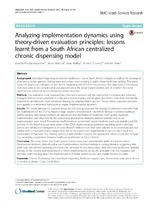Analyzing implementation dynamics using theory-driven evaluation principles: lessons learnt from a South African centralized chronic dispensing model
Date
2017Author
Magadzire, Bvudzai Priscilla
Marchal, Bruno
Mathys, Tania
Laing, Richard
Ward, Kim
Metadata
Show full item recordAbstract
BACKGROUND: Centralized dispensing of essential medicines is one of South Africa’s strategies to address the shortage of
pharmacists, reduce patients’ waiting times and reduce over-crowding at public sector healthcare facilities. This article
reports findings of an evaluation of the Chronic Dispensing Unit (CDU) in one province. The objectives of this process
evaluation were to: (1) compare what was planned versus the actual implementation and (2) establish the causal
elements and contextual factors influencing implementation.
METHODS: This qualitative study employed key informant interviews with the intervention’s implementers (clinicians,
managers and the service provider) [N = 40], and a review of policy and program documents. Data were thematically
analyzed by identifying the main influences shaping the implementation process. Theory-driven evaluation principles
were applied as a theoretical framework to explain implementation dynamics.
RESULTS: The overall participants’ response about the CDU was positive and the majority of informants concurred that
the establishment of the CDU to dispense large volumes of medicines is a beneficial strategy to address healthcare
barriers because mechanical functions are automated and distribution of medicines much quicker. However,
implementation was influenced by the context and discrepancies between planned activities and actual
implementation were noted. Procurement inefficiencies at central level caused medicine stock-outs and affected CDU
activities. At the frontline, actors were aware of the CDU’s implementation guidelines regarding patient selection,
prescription validity and management of non-collected medicines but these were adapted to accommodate practical
realities and to meet performance targets attached to the intervention. Implementation success was a result of a
combination of ‘hardware’ (e.g. training, policies, implementation support and appropriate infrastructure) and ‘software’
(e.g. ownership, cooperation between healthcare practitioners and trust) factors.
CONCLUSION: This study shows that health system interventions have unpredictable paths of implementation.
Discrepancies between planned and actual implementation reinforce findings in existing literature suggesting that
while tools and defined operating procedures are necessary for any intervention, their successful application depends
crucially on the context and environment in which implementation occurs. We anticipate that this evaluation will
stimulate wider thinking about the implementation of similar models in low- and middle-income countries.

